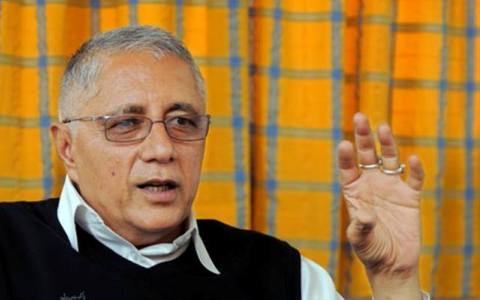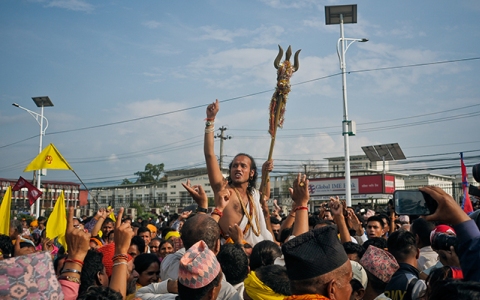Nepal’s new constitution fails both religion and secularism
by - 30th September 2015

NEPAL has become the world’s latest federal democratic secular republic.
Against the background of a huge and noisy throng of Hindu protesters clashing with the police, lawmakers inside the Constituent Assembly (CA) hall in Kathmandu on 14 September rejected a vote to restore Nepal to Hindu statehood.
The international media and activists had voiced concern over the possibility of the reinstatement of the Hindu constitution.
Yet lawmakers refused even a vote on the amendment. It received less than the requisite ten per cent support from Assembly members, indicative of the gulf that exists between majority opinion and lawmakers over the issue of secularism.
Recent polls indicate that the Nepali people who are mostly Hindu remain deeply suspicious of secularism - translated as dharmanirpekshata – literally dharma-neutrality.
This is in no small part because the word dharma has multiple meanings in the dharmic-traditions which include Hinduism, Buddhism, Jainism and Sikhism.
Compromise
A poll by the group Interdisciplinary Analysts (IDA) in February this year showed that while 71 per cent of the people polled supported a Hindu state, only 22 per cent supported secularism.
More recently, according to the Himalmedia Public Opinion Survey in August 2015, 51.7 per cent of those polled in Kathmandu wanted Nepal to be re-declared a Hindu state, while only 43.3 per cent opposed it.

In an interview with Lapido Media, Shekhar Koirala, member of the Assembly and senior leader of the ruling Nepali Congress,said the disconnect between public antipathy to secularism and support within the Assembly points to a political compromise.
‘The Nepali Congress was in favour of emphasising the clause which allows for complete freedom of religion.
‘Some of us wanted to take out the word secularism altogether, keeping Hindu sensibilities in mind, but given the pressure to promulgate the constitution and the opposition to it by other big parties, we had to compromise.’
A number of Hindu leaders from across the political spectrum of Nepali politics sought to find a compromise by stating that the whole constitution should allow for freedom of religion.
They argued it should either stay silent about secularism or use a term other than dharmanirpekshata.
Losing dharma
Dr Sthaneshwar Timalsina, of the Department of Religious Studies at San Diego State University,says the word dharma in dharmatic-traditions means more than a religion, implying‘moral obligation’.
‘Everyone has a dharma and there are multiple kinds of dharmas. Children have dharma, spouses have dharma, teachers have dharma, businessmen have dharma, and even leaders have dharma. Saying dharmanirpekshata means that the state has no moral obligation or duty.’
When one used the word dharma to mean only religion, one imposed a Western understanding on a non-Western context, imposing alien categories of religion with their single authoritative prophet, or text, on dharma, he added.
‘Perhaps a better word to express what they mean by religion, in the Western understanding of the word, would be parampara (tradition).’
Even in India, the translation of the word secularism into Hindi – also dharmanirpekshata – has been controversial.
Instead, a number of alternative words have been suggested, including panthanirpekshata or sect-neutrality, and sampradayanirpekshata or community-neutrality.
And this is the central problem: Nepal’s primary concern during its constitutional debate was accommodating various marginalised ethnicities. Religion was relegated to the second-tier of political importance, receiving less attention until it finally came to the vote.
This uncertainty of what dharmanirpekshata might mean for the future is not limited to Nepal’s Hindus.
In August, Muslim leaders made headlines for protesting in favour of a Hindu state. They argued that this would ensure Muslim-Hindu unity, and resist the growing influence of Christian missionaries in the country.
While an overwhelming number of Christians favour the end of the Hindu state, not all favour secularism.
Pastor Bir Bahadur Tamang, president of Mid-Central Unit of National Church’s Fellowship of Nepal – the largest Christian umbrella organisation in Nepal – told Lapido that he had personally protested against the Hindu state, in favour of freedom of religion.
However, secularism as dharmanirpekshata would, he said, ‘mean the growth of sin and moral degeneration’ in the country.
Troubles
His qualms are lost on Hindu militants who mistakenly equate secularism with Christianity. On 15 September, the day after the CA decided to retain secularism, members of a fringe Hindu outfit bombed four churches in eastern Nepal.
The bombs were small and led to minimal structural damage and no human casualties. Yet it points to a new trend in democratic Nepal, where religion is becoming a focal point of political militancy, with social bonds mattering less.
‘Given Nepal’s history, the social-cultural milieu of Hindus in Nepal was less politicised than in India, but this Constitution-making process has contributed to politicising the Hindus,’ says Koirala.
Debate
The new constitution is unclear about a number of important issues.
There are vague sub-clauses like the one that defines ‘secular’ to mean ‘the protection of religion and culture being practised since ancient times, and religious and cultural freedom’.
And, while the state now formally allows for religious freedom and the fundamental right to choose one’s religion, it bars people from converting ‘a person of one religion to another religion’.
This, Koirala cautions, will be the next issue of debate in Nepal. ‘Should conversion be allowed or not? The issue of religion and secularism is not yet over’, he says.
